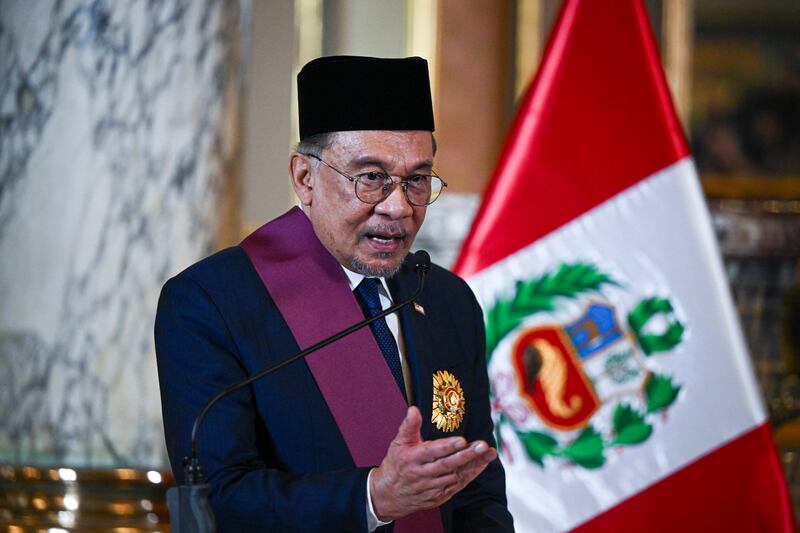Global criminal syndicates have been able to take advantage of Malaysia’s openness, build allies with local criminal organizations and exploit governance gaps.
Authorities are responding, but measures to date have failed to adequately protect victims or appreciate that more fundamental changes are needed.
Malaysia has long been on the scamming frontline. On average, citizens face multiple scam attempts daily, with Ipsos polling reporting this year that 76% have encountered scams and 51% have been victims of scams.
Fraudsters tied to transnational crime syndicates have used Malaysia to innovate the modes of scamming. Historically, the predominant repertoire involved impersonating a government official or police officer as part of the extortion.
RELATED STORIES
[ Malaysia to take legal action against Meta over ‘plague’ of harmful contentOpens in new window ]
[ 700 Malaysian workers stranded, held for ransom in Lao SEZOpens in new window ]
[ US Sanctions Help Crack Malaysian Crime RingOpens in new window ]
Now, scammers use artificial intelligence to impersonate voices and celebrities, including most recently Malaysia’s famous singer Siti Nurhaliza. They have the audacity to impersonate authorities based at the National Scam Response Center (NSRC) founded two years ago.
Chinese and other global criminal organizations have taken advantage of Malaysia’s openness, bringing syndicatesen masse to carry out operations in Malaysia visa-free and collaborating with local gangs.
One-off extortion has made way for systemic fraud in long-con investments, fabricated romances, sextortion and fake online jobs. Instead of going only for a small haul, scammers are using psychological tricks to completely drain victims of their assets through a process known as pig butchering in which every cent is taken.
Serious harm
It is a financial slaughter. Officially, losses to scamming over the last few years have reached U.S. $2 billion (8.9 billion ringgit).
Given research that shows most victims do not report fraud, a more realistic estimate is much higher. The Global Anti-Scam Alliance (GASA) estimated Malaysia’s losses at $12.8 billion (57.2 billion ringgit) based on its “State of Scam Report 2024,” or 3% of the national GDP. The real figure may be even higher as an astronomical wealth transfer is taking place as funds from ordinary citizens are coming into the hands of criminal groups.

Those victimized vary by the type of scam involved, with younger Malaysians more vulnerable to fake job scams and older victims targeted in long cons. Due to government leaks of private data, groups within Malaysia that have been especially victimized include teachers and civil servants about to retire.
By region within Malaysia, Sarawakians have been the most targeted, notably those in the rural areas. No one in Malaysia has been spared from the calls and phishing attempts, with victims ranging across age cohorts and communities.
The harm goes beyond devastating financial losses. Long known as a destination and transit hub for human trafficking, Malaysian citizens are being trafficked in unprecedented numbers to serve as laborers at scam compounds.
The Ministry of Foreign Affairs noted this month that 707 Malaysians have been part of their rescue efforts, with 199 still unaccounted for. These numbers capture only those reported to authorities, with non-government organizations and other rescue operations from scam compounds putting those trafficked much higher, well over 5,000.
Over 200 Malaysians have gone missing or have died to date. Thousands more innocent people who applied for fake jobs online are being forced to scam to survive, face torture or death.
This forced criminality often leads to these individuals revictimized by authorities, further destroying lives. Unlike Thailand, Malaysia has yet to put in place a victim protocol that recognizes forced criminality and fully appreciates the inhumane slavery conditions in the scam compounds located in neighboring ASEAN countries, notably Myanmar, Cambodia and Laos.
Addressing governance gaps
The media regularly describes the horrors of victims in these compounds – including rapes and physical beatings. In fact, Malaysia has made a good start in raising public awareness of scams and rising trafficking risks.
Moving forward to increase awareness, there needs to be more outreach to vulnerable communities, for youth in schools and for elderly through community engagement. Collaboration with civil society is vital.
Malaysia has also tightened online fraud regulations and created the NSRC, aiming to increase cooperation among authorities and engagement with the private sector, especially banks. New processes such as a “kill switch” were put in place to stop bank transfers.
Still, rising numbers and losses clearly show the measures are sorely inadequate. Police are inundated with reports, reaching well over half a million. There have been less than 50,000 investigations opened, but less than 5% of these have led to prosecutions and even fewer have led to convictions.
The governance gaps are multiple. It starts with denial. All too often scamming is portrayed as an external threat, with a failure to address enabling conditions and acknowledge the role that some Malaysians play in supporting illegal operations in the region.
Endemic corruption facilitates the illegal economy, reinforced by widespread local crime groups. Many criminals take advantage of limited regulation to operate legal businesses that serve as fronts for criminality. Too often, criminals use philanthropy to launder funds and forge a nexus with elites.
Scamming is now big business, with too many concerned about making money without asking where the funds are coming from and appreciating the costs to lives involved.

Malaysia’s laws remain woefully inadequate. Delays in private data legislation and serious leaks of government data have cost citizens billions of ringgit. There is resistance to laws to prevent online gambling, a gateway for scamming.
Casinos
Rather than reduce gambling, the administration of Prime Minister Anwar Ibrahim is considering opening new casinos without putting in needed protections to assure that the casinos do not enable criminality through money laundering and the misuse of cryptocurrency.
There are no penalties for scamming enablers or protections for whistleblowers of scam operations. Victims have limited legal pathways to seek justice.
With regard to institution-building, the creation of the NSRC and its “hot line” was a good step. It has been able to seize $10 million (44.7 million ringgit) in funds and forge cooperation between the government and private sector. Unfortunately, it has become bogged down in turf battles among agencies and lacks leadership.
An independent scam czar equipped with additional resources is needed.
Administrative reforms can also help. NSRC can expand its availability and make all portals tracking scamming activity accessible to the public, not just one.
As ASEAN chair in 2025, Malaysia has an opportunity to show regional leadership on this serious problem that needs multiple solutions. A key place to start is to acknowledge local dimensions to the problem and take steps to address them.
An independent researcher, Bridget Welsh is an honorary research associate at the Asia Research Institute of University of Nottingham Malaysia in Kuala Lumpur and a Senior Associate Fellow of The Habibie Center. The views expressed here are her own and do not reflect the position of the University of Nottingham Malaysia, The Habibie Center or BenarNews.
